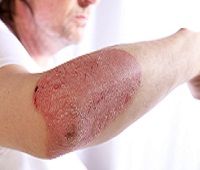Article
Pivotal Phase 3 Trial in Psoriasis Vulgaris Treatment
Author(s):
The development of MC2-01 Cream is designed to focus on the acute and long-term needs of patients.

The first patient has been dosed in a pivotal phase 3 clinical trial assessing the safety and efficacy of calcipotriene and betamethasone dipropionate (MC2-01 Cream) for the treatment of mild to moderate plaque psoriasis in adult patients, announced MC2 Therapeutics A/S.
The phase 3 randomized, vehicle- and comparator-controlled, parallel-group trial, planned to commence in Q3 of 2017, will evaluate the efficacy and safety of MC2-01 Cream compared to MC2-01 (calcipotriol) and MC2-01 vehicle control in subjects with psoriasis vulgaris. The trial is expected to enroll approximately 790 patients in about 57 centers across the US.
"Using our PAD™ Technology — a new class of vehicle — we have uniquely been able to develop a cream based fixed dose combination of betamethasone and calcipotriene — 2 molecules, which are known to be highly efficacious and yet safe, when used together once daily," Jesper Lange, president, MC2 Therapeutics, told MD Magazine. "We have overcome a very difficult task in formulating the 2 (normally incompatible) compounds into an elegant cream that absorbs quickly into the skin leaving it moisturized. We believe this patient-friendly approach will provide a long desired convenient and simple treatment regimen for psoriasis patients."
Subjects will apply the arms of the medication topically, once daily for up to 8 weeks. Arms include the experimental MC2-01 Cream with calcipotriene and betamethasone dipropionate; the active comparator, a calcipotriene and betamethasone dipropionate combination; and the placebo comparator, a cream vehicle.
The primary objective is to show therapeutic non-inferiority of MC2-01 to the active comparator, and characterize the safety profile of MC2-01 cream.
The primary efficacy endpoint is to measure the proportion of subjects in each treatment group with treatment success at week 8. Treatment success is defined as a minimum 2-point decrease from baseline in the Physician Global Assessment (PGA) score.
Secondary endpoints will be assessed and include patient acceptability of treatments on a Psoriasis Treatment Convenience Scale, and a modified Psoriasis Area and Severity Index (PASI) scoring system excluding scalp, face and flexures.
Topline results are expected in May of 2018, constituting the basis for a New Drug Application (NDA) submission.
“MC2-01 Cream is a new topical treatment designed with 100% focus on the acute and long-term needs of patients,” Lange said. “It quickly absorbs into the skin leaving it nicely moisturized allowing patients to move on in daily routines — a life companion for people living with psoriasis.”
Participants included in the trial must be 18 years of age, have written consent, a clinical diagnosis of plaque psoriasis of at least 6 months duration that involves the trunk and/or limbs that is amenable to topical treatment with a maximum of 100 g of trial medication per week, have a PGA of disease severity of mild or moderate on the body, an mPASI score of at least 2, and a treatment area involving 2—30% of the body surface area (BSA).
MC2-01 is a fixed dose combination of calcipotriene and betamethasone dipropionate. Using PAD Technology, a new class of vehicle, the formulation of calcipotriene and betamethasone dipropionate quickly absorbs into the skin, instead of resulting in a greasy formulation.
The single drug is designed for rapid relief, long-term maintenance of remission and patient adherence with the aim to introduce a new treatment.
A press release was made available.





